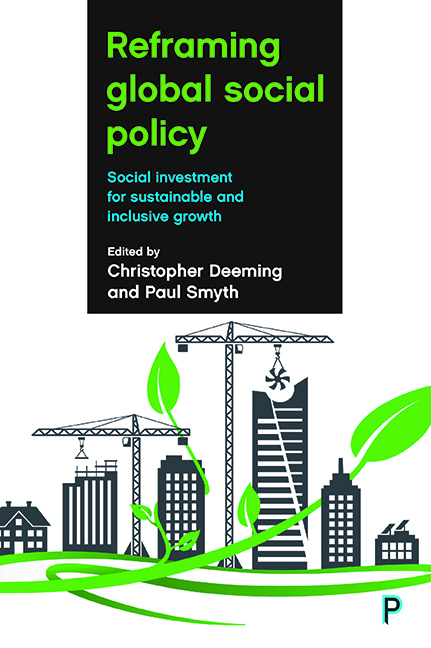Introduction and overview
Published online by Cambridge University Press: 12 April 2022
Summary
As uncertainty in the global economy continues we find there is already underway a new worldwide movement away from the ‘neoliberal’ policy models and frameworks of the late 20th century. Policymakers and epistemic communities are in search of a new understanding of society which has at its core the quest for a better integration of economic development with social and environmental policy, in order to promote what Barack Obama has called ‘shared prosperity’ (White House, 2011) and Christine Lagarde (2014) at the IMF has termed ‘inclusive capitalism’.
Certainly the idea of the social investment welfare state has attracted significant critical attention but the new ideas about inclusive economic growth and development have not been held up to such critical scrutiny within the academic social policy discipline even though the central problem of promoting economic development while reducing inequality is fast becoming the characteristic political desideratum of our time.
We now find a constellation of international organisations like the OECD, the IMF and the World Bank (key actors in the global social policy arena, see Deacon, 2007; Béland and Orenstein, 2013; Kaasch and Martens, 2015) constructing new ‘policy ideas’ (Béland, 2009, 2016) and alternatives for social investment, inclusive growth and sustainable development out of neoliberalism. Global social policy is now being reframed to promote inclusion and cohesion. Rebuilding solidarity across countries and regions continues to be a challenge, however. After the global economic crisis, the shock of Brexit and the rise of ‘populism’ in Europe and the US, with the rhetoric of protectionism and parties on the right promising to stop job competition through migrants and refugees, the politics of any postneoliberal policy settlement has become impossible to predict. Growing inequality, however, presents the major threat to environmental sustainability, to equity and to the world economy, and needs to be tackled now. According to the economist and Nobel laureate Joseph Stiglitz, capitalism does not have to produce inequality (Stiglitz, 2015: 75–6, 105–13, 300–05). With the right policies, it is possible to choose both efficiency and fairness, he argues.
This volume takes stock of the major changes that are already underway in the global policy arena – the neoliberal period having reached its social policy limits.
- Type
- Chapter
- Information
- Reframing Global Social PolicySocial Investment for Sustainable and Inclusive Growth, pp. 1 - 8Publisher: Bristol University PressPrint publication year: 2017



